It’s sometimes asked why Extinction Rebellion (XR) doesn’t set out any solutions to the climate and ecological emergency. Some critics argue that highlighting the problems is easy, but that XR isn’t doing the difficult part: providing the answers. It’s true that attempting to tackle the climate and ecological emergency is an incredibly complex and challenging task, but it isn’t an impossible mountain to climb.
The truth is that the solutions already exist - what doesn’t currently exist is the political will to implement them rapidly enough - changing this is what XR aims to do. XR is trying to force action, rather than just highlighting the failure of government and institutions.
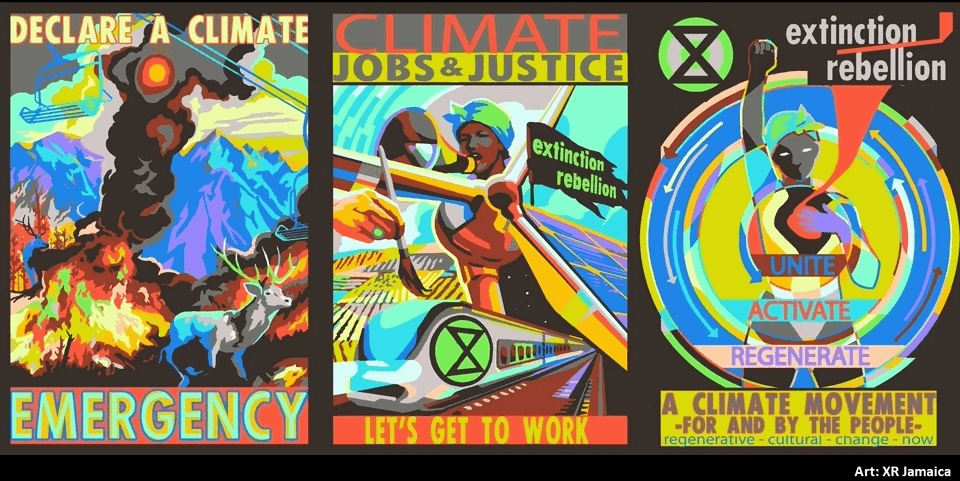
© XR Jamaica
We already know what the solutions are
One reason we’re not proposing solutions is that they’re already well known. There is little benefit in us trying to reinvent the wheel when deliverable solutions exist and are well documented.
We know that climate change is being driven by emissions of greenhouse gases such as carbon dioxide, and that these are increasing as a result of human activity. In order to prevent further global warming we need to reduce these emissions. Organisations like the Centre for Alternative Technology in Wales have set out in detail how we can achieve the necessary reductions in emissions. This will require systemic actions such as ending the use of fossil fuels and individual changes like reducing our consumption of meat and dairy.
Another major component of the climate and ecological emergency is the loss of biodiversity. We’re currently in the midst of our planet’s sixth mass extinction event and once again the primary driver for this is human activity. We know that loss of biodiversity is being caused by things such as loss of habitats, use of chemicals and climate change. Knowing what’s causing it means we also know exactly what needs to change in order to prevent it.
The problem isn’t being unaware of the solutions, it’s the dangerous unwillingness to implement them. This is the problem that XR is addressing.
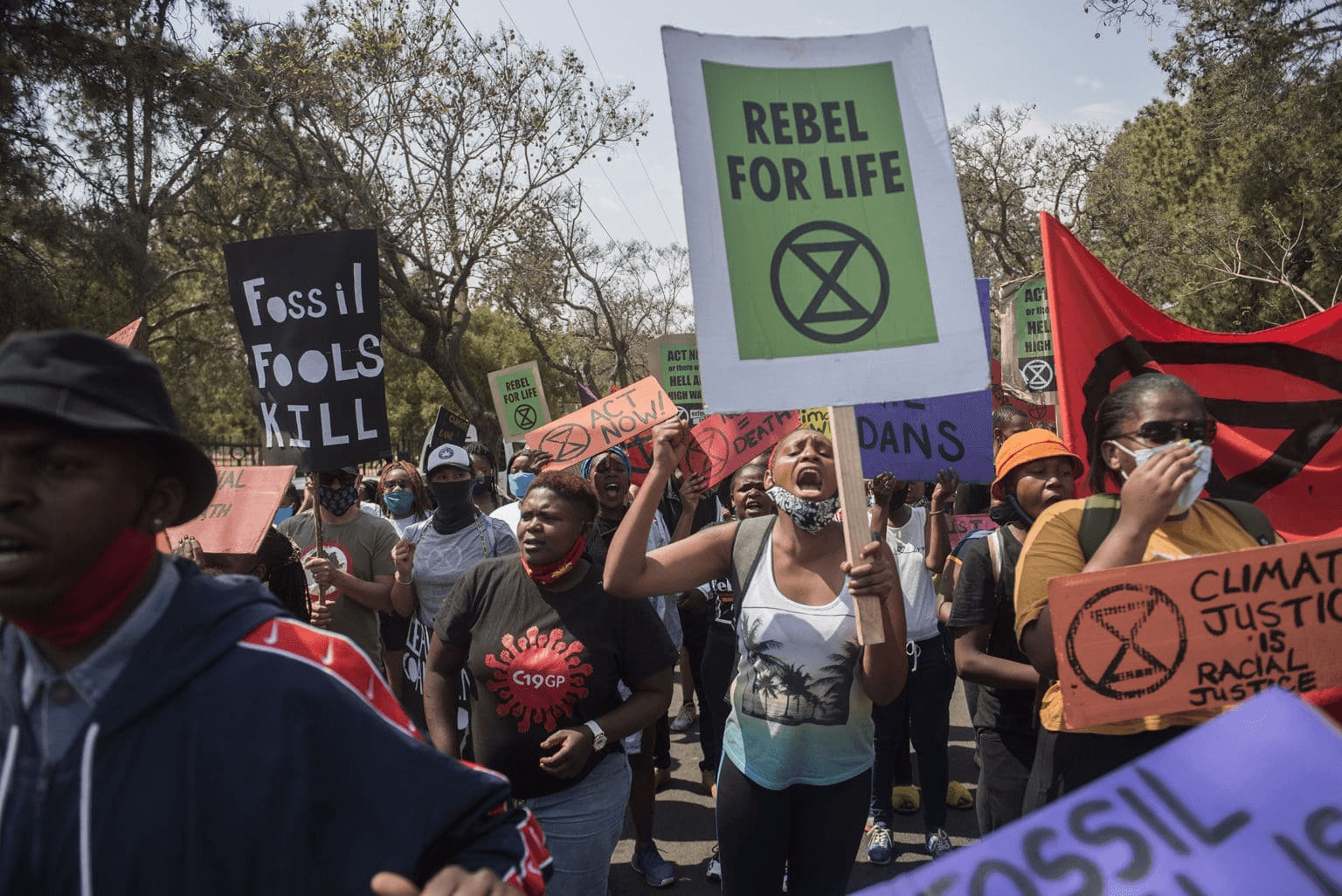
© Shiraaz Mohamed
You don’t have any solutions*
*(that I like)
When people complain about a lack of solutions, this often translates into either:
- “I don’t know enough about this subject”
- “I don’t like the solutions that exist”
“I don’t know enough about this subject”
A quick Google search of “what are the solutions to climate change?” offers plenty of answers. This obviously comes with the standard health warning that not everything on the internet is true. However, sticking with reputable sources tends to result in similar solutions coming up fairly consistently. These same suggestions can also be found in numerous books, articles such as this one, TV programmes and films on the subject. You’re also likely to find some of them in the environmental action plans of governments and businesses (albeit, often in a more limited or diluted form than the situation demands). Greater caution is advisable when looking at these; in some cases their inclusion stems from a genuine desire to protect the planet, but in others they’re just greenwashing. So, the truth is, we know what needs to be done - absence of solutions isn’t the issue, it’s unwillingness to put them into practice at the scale and pace that’s required.
XR’s first demand is that governments Tell the Truth about the climate and ecological emergency. Doing this will help address the problem of people not knowing enough about the subject. We need as many people as possible to understand our present situation and the actions needed to prevent it getting worse. Our second demand is that governments Act Now and take immediate action on the massive scale that’s required to address the climate and ecological emergency.
“I don’t like the solutions that exist”
Given the solutions are well documented and many are already being implemented to some extent, lack of awareness often isn’t the issue. The problem is that these solutions aren’t ones that many individuals, politicians or businesses want to hear or implement.
For example, there’s widespread understanding that air travel generates harmful emissions and that reducing it would be good for the environment. Research has shown that a large proportion of these emissions are generated by a small minority. There’s little argument that the solution requires reductions in air travel and the primary obstacle is reluctance to do this. This manifests itself not only in the unwillingness of some individuals to amend their behaviour, but also the reluctance of governments to incentivise or force change through means such as frequent flyer levies or other legislation.
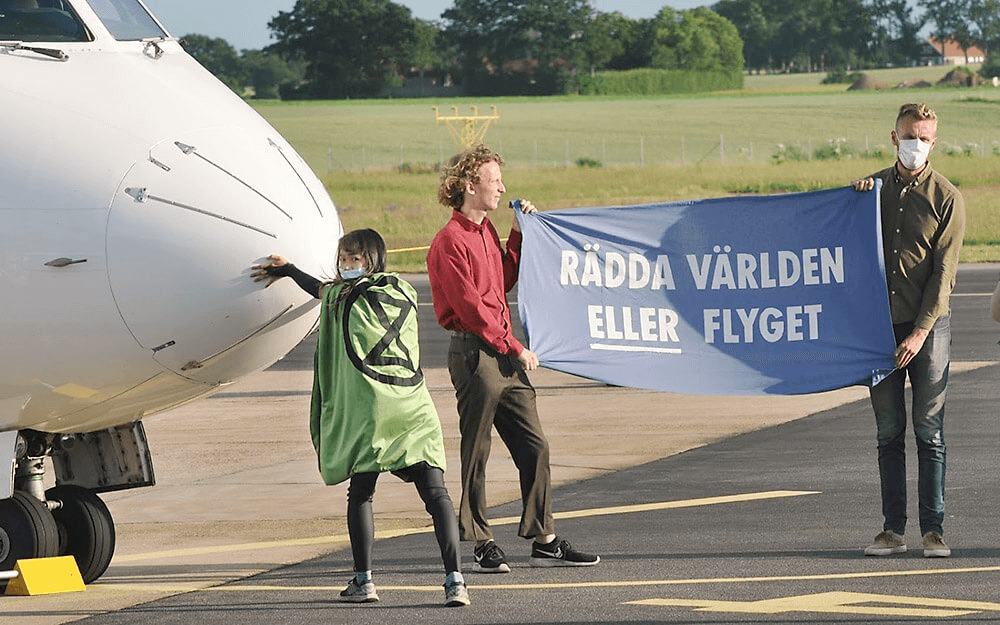
‘Save the World or Aviation’ © XR Sverige
It’s a mistake to assume that people in organisations such as XR like these solutions any more than anyone else does. It may be the case, but sometimes the only difference is an acceptance of their necessity. This can simply be the result of a greater appreciation of the terrible consequences of inaction.
This interview with an airline pilot illustrates how someone can love travelling and be reliant on the airline industry for their income, yet still recognise the need for change. Accepting that something needs to happen and liking it are not the same thing.
Air travel also provides a perfect example of the dangers of being drawn towards seductive hypothetical solutions that don’t currently exist. There’s very little prospect of cost-effective low emission airliners being available anytime soon, yet many people still prefer to focus on this as the way forward. It may happen in the future, but the time-frame is incompatible with the speed at which we need to reduce emissions to prevent catastrophic climate change.
Changing how we think about the climate and ecological emergency
The glass is half full
Think of the climate and ecological emergency like an illness: climate scientists are telling us that our planet is seriously unwell. However, the good news is that most don’t think it’s terminal (at least not yet) and there are still plenty of things we can do about it. As a patient, once we’d got past the initial shock of learning we were ill, we’d probably be very glad to hear that treatments were available that could save us. It’s also likely that we’d want to get started with our treatment as soon as possible.
This is exactly the position we’re in with the climate and ecological emergency, but we’re not responding to it in the same way. Rather than feeling positive that a cure exists, there’s often a focus on the downsides of the treatment. Like treatment for a serious illness, solutions to the climate crisis may have a negative impact on our lives. They may mean that individuals in wealthier countries are no longer able to lead the same lifestyles as before; or that governments can no longer rely on the same cheap, dirty fuel sources. However, these undesirable consequences are much easier to accept once we recognise the simple truth that they’re necessary in order to save ourselves and others.
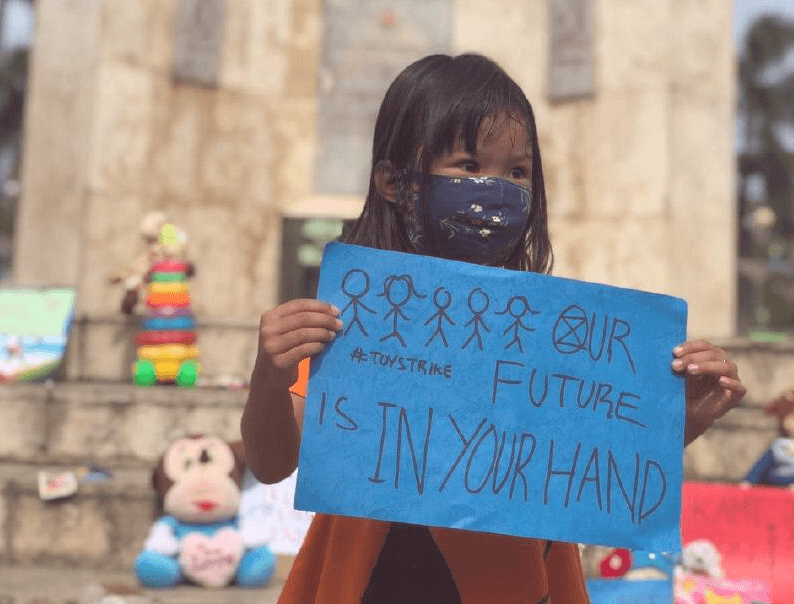
Act now
We know that many people are already suffering the consequences of the levels of global warming happening today. However, many still seek to delay action, even though the projected consequences of doing so are much worse. When a person is diagnosed with cancer, the aim is normally to treat it as quickly as possible. In most circumstances people don’t ask how long they can delay treatment or how far they could allow the illness to progress.
We need to think about climate change in the same way we think about cancer - there isn't a safe level, which is why we need to take immediate action before it gets even worse. Another sobering parallel is that we can’t say with certainty at what point a cure will no longer be possible. There are incredibly complex inter-relationships in the natural world and potential for climate feedback loops to become established. This complexity means that it’s impossible to predict with any confidence when tipping points might occur that could leave us powerless to prevent further climate change. What we do know is that delay reduces the chances of a positive outcome and that it will mean that more extreme action is required.
With a life threatening illness, very few of us would reject existing treatments and gamble on a better cure being developed in the near future. Yet this is what we risk by investing too much confidence in new technologies such as carbon removal. Carbon removal is currently unproven at anything like the scale required to have a real impact on climate change. It may indeed prove to be a solution in the future, but it’s completely irresponsible to bank on this. If we think of the climate and ecological emergency like a life threatening illness, then going with the best solutions currently available represents the most prudent way forward.
XR’s role
We are creating solutions to address inaction on the climate and ecological emergency - not technical solutions to climate change and loss of biodiversity, as we already have those.
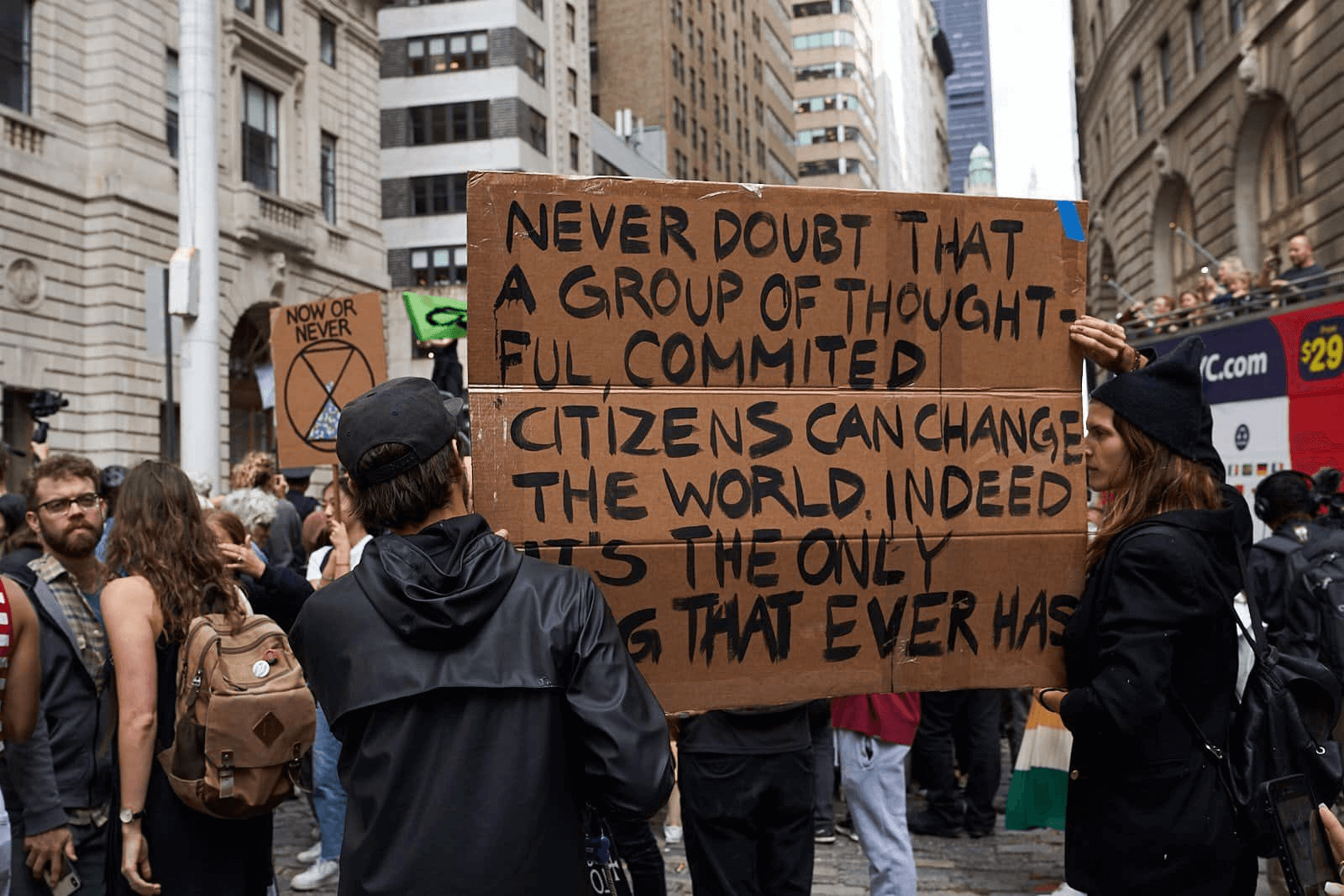
Another reason XR isn’t advocating specific solutions is that our third demand is for the creation of citizens' assemblies. A citizens’ assembly involves a representative cross section of ordinary people learning about a subject and then coming up with recommendations on the way forward. Allowing normal people to determine our collective future offers a far better way forward than relying on politicians fearful of losing votes or a handful of billionaires to make all the difficult decisions. We believe that once people are given sufficient information and understand the options, they’ll be able to determine the best course of action. It isn’t appropriate for us to tell them what their answer should be before they get started.
XR aims to increase awareness and understanding of the crisis, while also directly addressing the immoral lack of urgency to act. We want governments and the media to be completely open and honest about the full extent of the crisis we face, so that everyone understands its severity and the causes (Tell the Truth). This is so we can all push governments to take action at the speed the situation demands (Act Now). The solutions are all there and we want ordinary people (not just XR members) to make informed decisions on implementing them through citizens’ assemblies.
Doesn’t sound too unreasonable or extreme, does it?